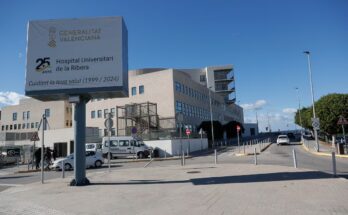It took Portugal seven years to make it difficult for drug boats to come and go, which until a few days ago enjoyed benevolent legislation. The new law, which increases control over the production, ownership and crewing of fast boats and provides prison sentences for those who violate it, was promulgated by the President of the Republic, Marcelo Rebelo de Sousa, on October 28, the day after the death of Republican National Guard corporal Pedro Manata e Silva in the Guadiana River while chasing drug traffickers. A disastrous coincidence. “It is a fundamental law to combat trafficking and should have been approved a long time ago,” laments César Nogueira, president of the Association of Guard Professionals (APN) and friend of the deceased corporal. “It was inevitable that drug traffickers would turn to our shores after Spain banned high-speed boats,” he adds.
The police patrol boat on which the corporal was traveling was hit by the drug speedboat, which was abandoned shortly afterwards. Three other officers were seriously injured. The event recalls other fatal accidents that occurred during operations in southern Spain and confirms, according to César Nogueira, that it is a violent reaction already transformed into a strategy by drug traffickers. “Their boats are much more efficient than ours, we must invest in improving our resources. Criminals are always ahead of the police,” he argues.
The Minister of the Interior, Fernando Grande-Marlaska, assured that the Portuguese law is “a big step against organized crime” after meeting his counterpart, Maria Lúcia Amaral, a week ago in Lisbon, whom he thanked for her collaboration. Spain changed legislation in 2018 to crack down on the transport of drugs and migrants in fast semi-rigid boats and banned their private use. Drug traffickers, who live outside the law but know it, have moved shipping logistics to Portugal. With its 943 kilometers of continental coastline and navigable rivers, it became a haven for the production and storage of drug boats used in the trafficking of cocaine and hashish by the mafias of northern and southern Spain.
“The drug depots have moved to points bordering or close to the border, in northern Spain. The members of the networks work there with the pieces and then take them”, explain sources from the Intelligence Center against Terrorism and Organized Crime (CITCO), dependent on the Ministry of the Interior. “Criminal organizations usually have docks in the central and northern area for repairs and in the southern area for shelter,” they add.
If there were any doubts about that, it was clarified this summer. On July 11, the Civil Guard and the National Republican Guard (GNR) announced the dismantling of the “largest drug trafficking structure” on the Iberian Peninsula. In addition to the arrest of 64 people and the confiscation of almost eight tonnes of drugs, 18 fast boats and 40 high-power Yamaha engines were seized, many of them still crammed into a trailer. A GNR spokesperson directly linked the activity to legal permissiveness: “The legislative change in Spain that criminalized this logistical action forced these groups to move to Portugal starting in 2019 to have more facilities.”
The Spanish-Portuguese network dismantled in July had created illegal shipyards in the Tagus estuary. It had achieved such “professionalization”, according to the Guardia Civil, that they could launch three launches simultaneously in the same night. Some brand new narcoboats revealed hormonal power with four 300 horsepower engines, useless for pleasure trips.
Clandestine ships where the boats were prepared also emerged in northern Portugal, which has always been connected to the trafficking networks of the Rías Baixas. In October 2024, in another joint operation between Spain and Portugal, 24 people from a maritime transport organization were arrested.
Before the major summer operation, Artur Vaz, director of the National Drug Trafficking Unit of the Judicial Police, explained in an interview in Lisbon that the increase in drug traffickers’ activity was visible after the Spanish ban. “We have seen that they are used to going further and further into the Atlantic and can spend weeks at sea, supported by others carrying logistical support of fuel and food,” Vaz revealed.
Another phenomenon observed by the Portuguese Judicial Police is the appearance of organizations specialized exclusively in drug transport. “There was a network based in Spain operating in Caparica, which offered this service to others and could have up to ten boats in the water,” explained Artur Vaz. PJ’s statistics show a revealing evolution. If until 2018 five or six boats were confiscated every year, since then the figure has doubled or tripled, with the exception of the pandemic years. Between 2023 and 2024, 32 boats were seized.
Although the Spanish government has repeatedly called for a ban on drug boats, Lisbon until recently seemed reluctant. Even during the days of socialist concord between Prime Minister António Costa and President Pedro Sánchez no progress was made, although the president of the Association of Guard Professionals, César Nogueira, points to another explanation: “One of the reasons for the delay was that we had many changes in the government.”
Since 2018, Portugal has gone through several political crises that have caused great instability and the fall of three governments. The law, which was drafted several times, was finally approved this summer in a Council of Ministers chaired by Prime Minister Luís Montenegro (centre-right), who made citizens’ safety one of the flags of his mandate. The law was ratified by the Assembly of the Republic thanks to the votes of the four right-wing parties, which have 70% of the seats, and the abstention of the entire left. It does not ban the use of fast boats for private use as Spain did in 2018, but now requires registration of manufacture, ownership and circulation. Violation of the law, which prohibits entry and exit from the country by these means of transport without the permission of the tax authority, can result in penalties of one to four years in prison.
The Spanish Interior Minister declared himself “optimistic” about the prospects offered by the Portuguese legislation. “It is not an identical regulation to the Spanish one, but it establishes a very effective and very direct control,” he underlined a week ago in Estoril, where he participated in the ministerial conference of the United States and the countries of the Middle East and North Africa.
New journeys
Legal obstacles posed by Portugal to drug traffickers could lead to the displacement of criminal organisations, according to police sources experienced in investigating organized crime. They can drift towards France, towards the coast of Girona, or south towards Morocco. “Portuguese law is a very advantageous way to cut corners on organizations,” says one such source. Everyone agrees on the importance of international cooperation and joint action. The anti-drug prosecutor, Rosa Ana Morán, underlined in a recent interview with EL PAÍS the need for these ships to be banned throughout Europe.
“We have reached out to all our European partners, with the specific aim of moving forward with the regulation of drug traffickers,” said Minister Marlaska. “Portugal is already advanced, it already has a law in this sense. Now it must develop it”, he concluded.
More than 1,700 ships seized in five years
The effects of the ban on drug traffickers in Spain have been revealed in police statistics. Although data from the Special Security Plan for Camp Gibraltar, now in its fifth edition, does not specify the number of drug vessels seized by security forces and bodies, there has been a substantial increase in the total number of vessels seized. In five years they reached 1,699. From 2019 to 2024, the annual average of ships seized is 238, while in 2018 there were 22. In Galicia, where the data is broken down, the peak was reached in 2022, with 84 fast ships seized, while in 2024 there were nine.



